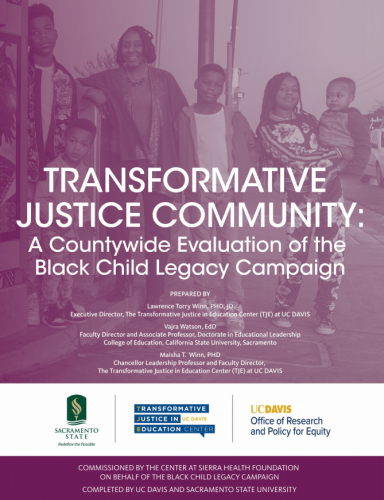Transformative Justice in Education Center Publishes Evaluation of Sacramento’s Black Child Legacy Campaign
The School of Education’s Transformative Justice in Education Center has released “Transformative Justice Community,” a report detailing two years of research conducted in collaboration with Sacramento State and the UC Davis Office of Research and Policy for Equity. The research team evaluated Sacramento’s Black Child Legacy Campaign, a movement established by the Steering Committee on Reduction of African American Child Deaths to work toward reducing the preventable deaths of Black children.
Overall, “BCLC has surpassed and exceeded its bold and audacious goals by focusing on the data, engaging and supporting the community, providing resources to local organizations to lead, and coordinating systems,” Prof. Maisha Winn and Prof. Lawrence “Torry” Winn write. The report’s conclusions on the effectiveness of the strategies in building a sustainable system of support to protect children from preventable deaths are further supported by recent data showing that the rate of Black child deaths decreased by 30% from 2014 to 2018.
The report provides context for the conditions in which BCLC exists, details the impact and success of the campaign’s methods, provides “portraits” of figures behind and involved in BCLC and identifies areas of improvement. This includes an examination of each of BCLC’s five strategies, which are to build systems for community advocacy, systemic impact, support for families, accountability and communications.
“This detailed, insightful report examines and affirms the effectiveness of the Black Child Legacy Campaign’s five strategies in helping to create a sustainable structure of local and statewide advocacy, initiatives for systemic change, and coordinated systems of support for Black children and their families throughout Sacramento,” said UC Davis Chancellor Gary May.
The critical research into BCLC was performed using a transformative justice framework developed by Maisha Winn, which acknowledges history, race, justice, language and futures.
“By applying a transformative justice framework, these scholars were able to document a culturally relevant, community-driven movement that is asset-based and holistically supports the well-being and overall health of Black families and communities,” said Robert Nelsen, Sacramento State University president.
The BCLC received funding from Sacramento County, the city of Sacramento, and First 5 California, among other sources. It was managed by The Center at Sierra Health Foundation.
For more information, see the UC Davis media release.









